Hitches are devices that attach a trailer to a towing vehicle.
They are essential for safely and securely transporting goods, equipment, and recreational vehicles.
There are several types of hitches, each with its own advantages and disadvantages.
In this article, we’ll discuss some of the most common types of hitches and which ones you may want to avoid based on your specific towing needs.
Most Common Types Of Hitches:
There are several types of hitches commonly used for towing:
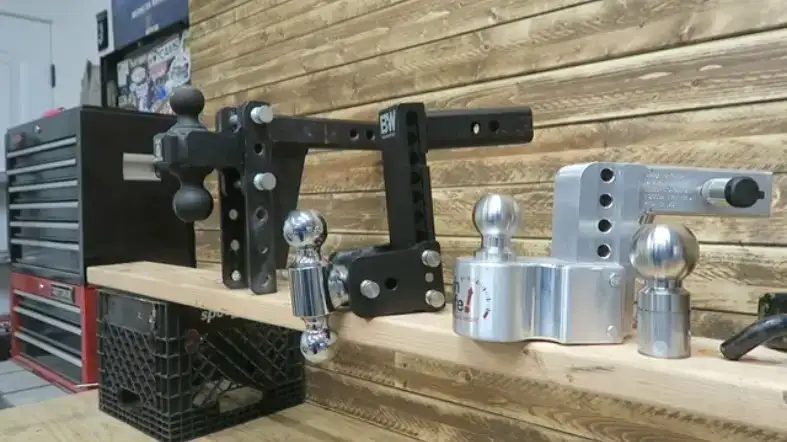
- Ball hitch
- Pintle hitch
- Fifth wheel hitch
- Gooseneck hitch
- Weight-distributing hitch
- Bumper-Mounted Hitch
- Front-Mounted Hitch
- Receiver Hitch (Class 1-5)
- Rear Receiver Hitch
Different Types Of Hitches Capacity:
Here you can find the types of hitches with their towing capacities,
| Hitch Type | Towing Capacity |
|---|---|
| Ball Hitch | 2000-30,000 lbs. |
| Pintle Hitch | Up to 60,000 lbs. |
| 5th Wheel Hitch | Up to 30,000 lbs. |
| Gooseneck Hitch | Up to 38,000 lbs. |
| Weight Distribution Hitch | Up to 15,000 lbs. |
| Bumper-Mounted Hitch | Up to 4,000 lbs. |
| Front-Mounted Hitch | Up to 12,000 lbs. |
| Receiver Hitch (Class 1-5) | Up to 20,000 lbs. |
| Rear Receiver Hitch | Up to 20,000 lbs. |
Ball hitch:
This is the most common type of hitch, typically used for towing small trailers or other lightweight vehicles.
It consists of a ball-shaped coupling that attaches to a receiver on the vehicle’s frame.
Pintle Hitch:
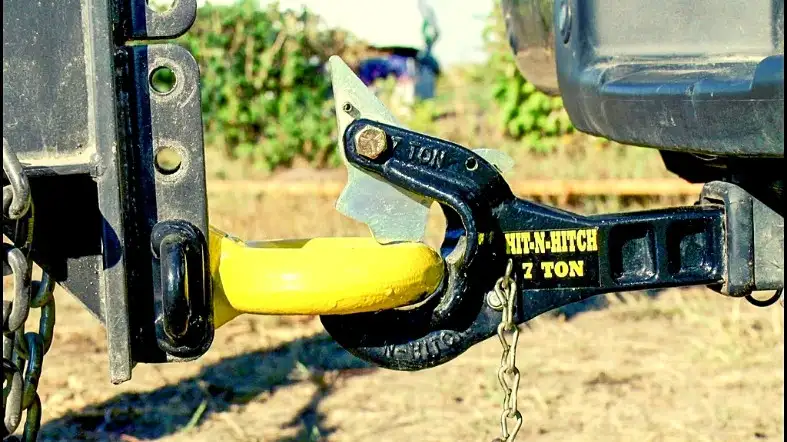
A pintle hitch is a type of hitch that couples to a lunette ring.
Lunette rings are typically used on heavy-duty vehicles, such as dump trucks or fire trucks.
Pintle hitches have a higher towing capacity than fifth wheel hitches or gooseneck hitches. They can typically tow up to 60,000 pounds.
5th Wheel Hitch:
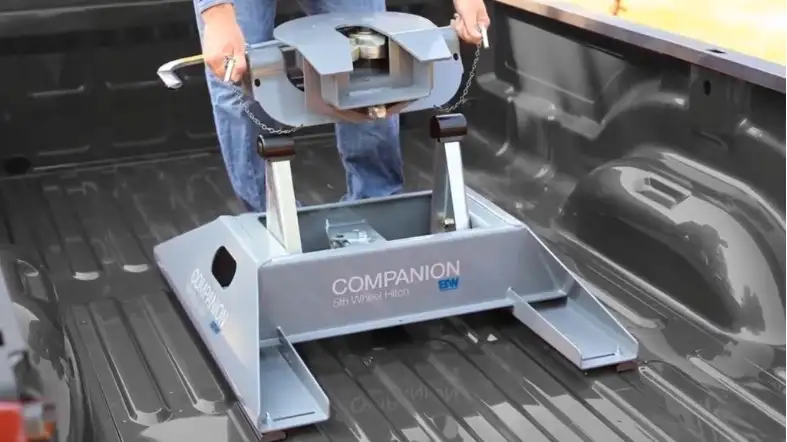
A fifth wheel hitch is a type of hitch that couples to a fifth wheel kingpin.
It is typically used for towing large trailers, such as RVs or horse trailers.
Fifth wheel hitches are only used with pickup trucks, and not with SUVs or other types of vehicles.
Also, fifth wheel hitches have a higher towing capacity than gooseneck hitches or bumper-mounted hitches. They can typically tow up to 30,000 pounds.
Gooseneck Hitch:
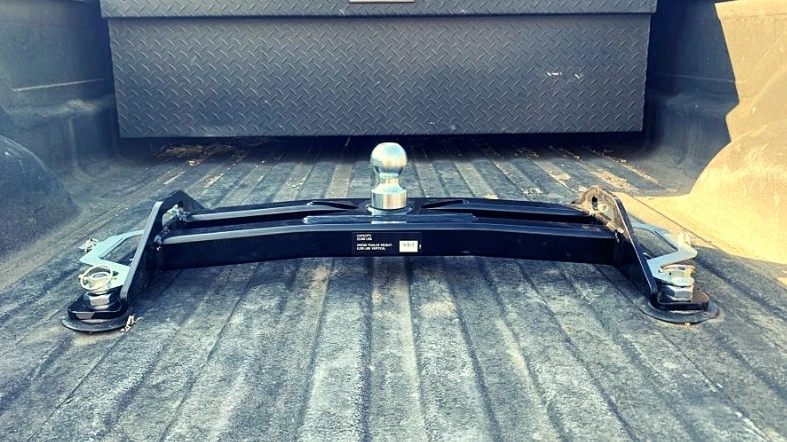
A gooseneck hitch is a type of hitch that couples to a gooseneck trailer.
Gooseneck trailers are typically used for hauling large loads, such as livestock or construction equipment.
Gooseneck hitches have a higher towing capacity than fifth wheel hitches or bumper-mounted hitches. They can typically tow up to 38,000 pounds.
Weight Distribution Hitch:
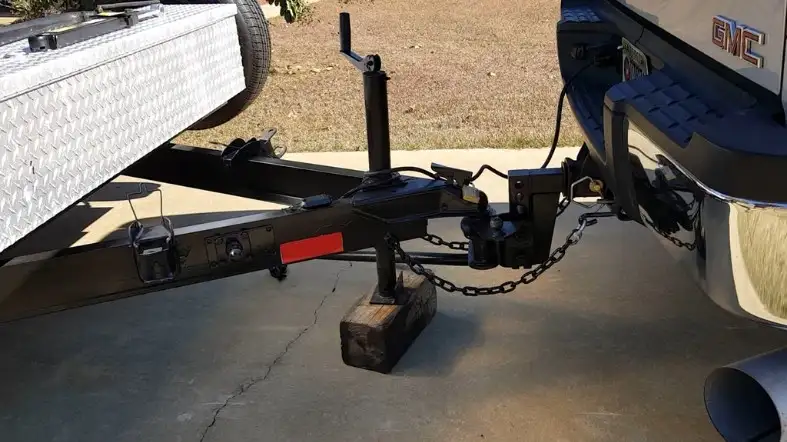
A weight distribution hitch is a type of hitch that helps to level a vehicle and trailer when they are coupled together.
This type of hitch is typically used when towing a trailer with a large load, such as an RV or horse trailer. Weight distribution hitches can typically tow up to 15,000 pounds.
Bumper-Mounted Hitch:
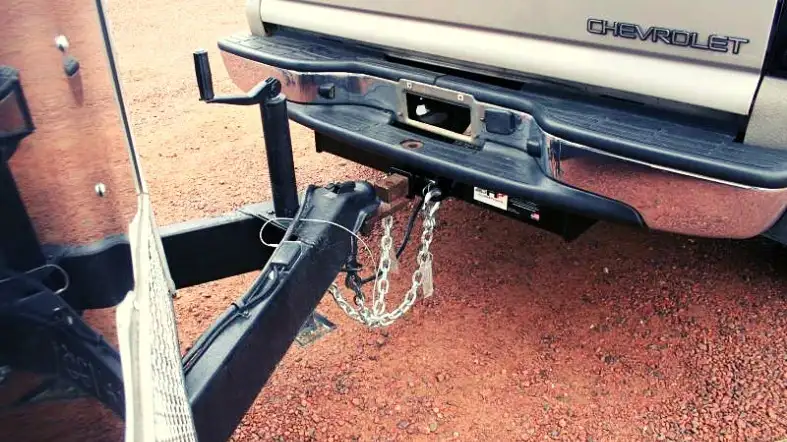
A bumper-mounted hitch is a type of hitch that attaches to the bumper of a vehicle.
Bumper-mounted hitches are typically used for towing small trailers, such as utility trailers or boat trailers.
Bumper-mounted hitches can typically tow up to 4,000 pounds.
Front-Mounted Hitch:
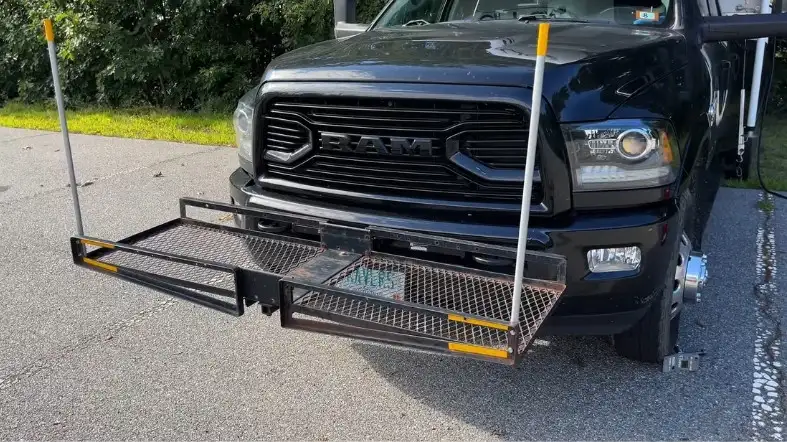
A front-mounted hitch is a type of hitch that attaches to the frame of a vehicle in the front.
Front-mounted hitches are typically used for towing medium-sized trailers, such as campers or pop-up trailers.
Front-mounted hitches can typically tow up to 12,000 pounds.
Receiver Hitch (Class 1-5):
A receiver hitch is a type of hitch that provides a tube for accessories.
Receiver hitches are available in different classes, with Class 1 being the smallest and Class 5 being the largest.
Receiver hitches can be used for towing small trailers, such as utility trailers or boat trailers. Receiver hitches can typically tow up to 20,000 pounds.
Rear Receiver Hitch:
A rear receiver trailer hitch is a type of hitch that provides a tube for accessories.
Rear receiver hitches are available in different classes, with Class 1 being the smallest and Class 5 being the largest.
Rear receiver hitches can be used for towing small trailers, such as utility trailers or boat trailers. Rear receiver hitches can typically tow up to 20,000 pounds.
How to Choose the Right Trailer Hitch for Your Vehicle?
When choosing a hitch for your vehicle, you will need to consider the following factors:
- The type of vehicle you have
- The type of trailer you will be towing
- The weight of the trailer
- The towing capacity of the hitch
The type of vehicle you have:
Will the hitch be mounted on a car, SUV, truck, or van?
The type of vehicle you have will determine what type of hitch you can use.
In most cases, you will be limited to using a hitch that is compatible with your vehicle.
The type of trailer you will be towing:
The type of trailer you plan on towing will determine the type of trailer hitch you need.
For example, if you are going to tow a large RV, you will need a fifth wheel hitch.
The weight of the trailer:
How much does the trailer weigh? The weight of the trailer must be within the towing capacity of the hitch.
Otherwise, you risk damaging your vehicle or causing an accident.
The towing capacity of the hitch:
Each hitch has a different towing capacity.
Be sure to choose a hitch that has a towing capacity that is greater than the weight of the trailer you plan on towing.
Otherwise, you risk damaging your vehicle or causing an accident.
How To Install The Right Hitch?
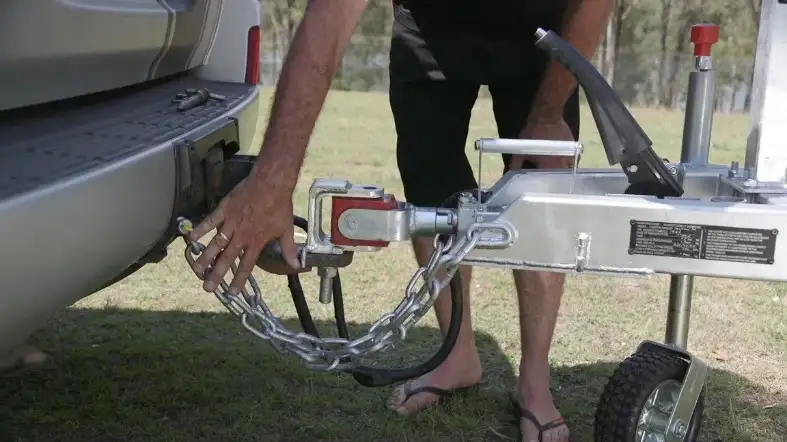
Now that you know the different types of hitches. Here is a quick guide on how to install the right hitch for your vehicle.
1. Read the instructions that came with your hitch.
2. Park your vehicle on a level surface and set the parking brakes.
3. Disconnect the negative battery cable from the battery.
4. Raise the rear of the vehicle with a jack and support it with jack stands.
5. Locate the hitch mounting points on the frame of the vehicle.
6. Attach the hitch to the frame using the bolts and nuts that came with it.
7. Tighten the bolts and nuts to secure the hitch in place.
8. Lower the vehicle and remove the jack and jack stands.
9. Reconnect the negative battery cable to the battery.
10. Test the hitch by attaching a trailer and making sure it is securely fastened. Follow all safety precautions when testing your hitch.
How Hitches Are Used?
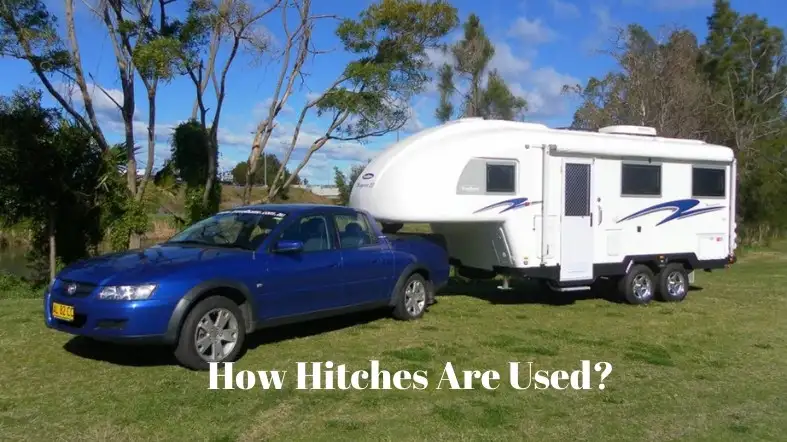
Hitches are commonly used for towing trailers.
However, there are many other uses for hitches.
For example, hitches can be used to mount bicycle racks or cargo carriers.
Hitches can also be used to secure a boat or ATV to a vehicle.
The Benefits Of Using A Hitch:
There are many benefits to using a hitch. Here are the top 10 benefits:
1. Provide a secure connection
2. Can be used for multiple purposes
3. Ensures safe towing
4. Can be easily installed
5. No need to drill holes in your vehicle
6. Protects your vehicle from damage
7. Prevents trailer sway
8. Improves fuel economy
9. Reduces wear and tear on your vehicle
10. Allows you to tow a heavier load
Provide A Secure Connection:
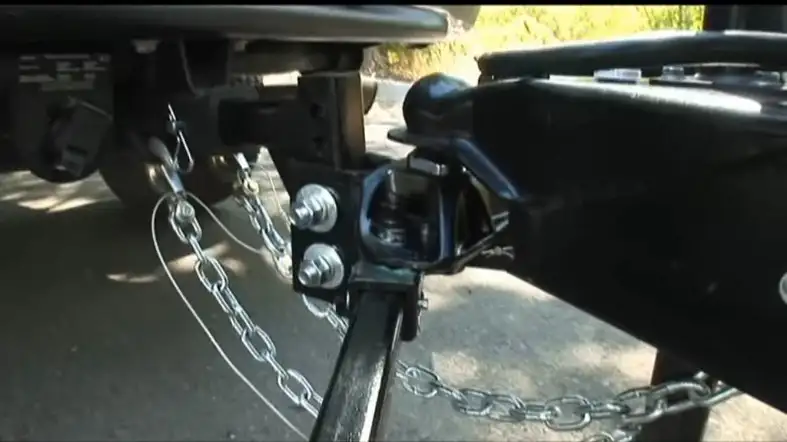
A hitch provides a secure connection between your vehicle and the trailer.
It ensures that the trailer will not come loose while you are driving.
Can be used for multiple purposes:
Hitches can be used for more than just towing trailers.
They can also be used to mount bicycle racks or cargo carriers.
It allows you to use the hitch for multiple purposes.
Ensures safe towing:
A hitch ensures safe towing by providing a secure connection between your vehicle and the trailer.
This prevents the trailer from coming loose and causing an accident.
Can be easily installed:
Hitches can be easily installed by following the instructions that come with them.
In most cases, you will not need to drill holes in your vehicle to install the hitch.
No Need To Drill Holes In Your Vehicle:
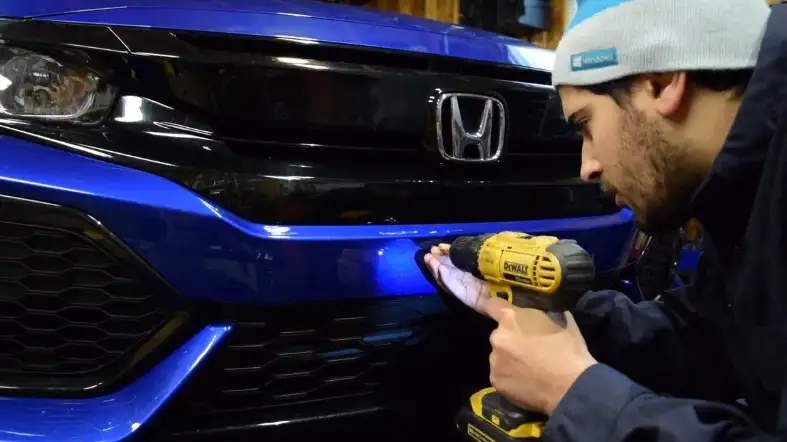
Most hitches do not require you to drill holes in your vehicle to install them.
This is convenient because it protects your vehicle from damage.
Protects your vehicle from damage:
Hitches protect your vehicle from damage by preventing the trailer from coming loose and hitting your vehicle.
It can cause serious damage to your vehicle if the trailer comes loose.
Prevents trailer sway:
Hitches prevent trailer sway by providing a secure connection between your vehicle and the trailer.
This is important because it can cause an accident if the trailer starts to sway.
Improves Fuel Economy:
Hitches can improve fuel economy by reducing the drag on your vehicle.
This is important because it can save you money on gas.
Reduces wear and tear on your vehicle:
Hitches can reduce wear and tear on your vehicle by preventing the trailer from coming loose and hitting your vehicle.
It can cause serious damage to your vehicle if the trailer comes loose.
Allows you to tow a heavier load:
Hitches allow you to tow a heavier load by providing a secure connection between your vehicle and the trailer.
It allows you to tow a heavier load without damaging your vehicle.
Tips for using your hitch safely and effectively:
1. Read the instructions that come with your hitch carefully before installation.
2. Make sure the hitch is properly secured to your vehicle before towing a trailer.
3. Inspect the hitch regularly to make sure it is in good condition.
4. Do not exceed the weight limit for your hitch.
5. Use caution when backing up while using a hitch, as it can increase the risk of an accident.
6. Be aware of your surroundings and take extra care when driving in inclement weather or on rough roads.
7. If you are not using your hitch, be sure to remove it from your vehicle to prevent damage.
8. Follow all safety precautions when using a hitch to avoid accidents and injuries.
Hitch troubleshooting and maintenance tips:
Most common hitch problems can be easily fixed with a few simple steps.
If you are having trouble with your hitch, here are a few tips to help you troubleshoot and fix the issue:
1. If your hitch is not properly secured to your vehicle, it can cause the trailer to come loose. Make sure the hitch is properly installed and tightened before use.
2. If the hitch is not level, it can cause the trailer to sway. Use a level to check the hitch and make sure it is level before towing a trailer.
3. If the hitch is not properly aligned, it can cause the trailer to veer off course. Make sure the hitch is properly aligned before use.
4. If the hitch ball is not properly secured, it can come loose and cause an accident. Make sure the hitch ball is properly tightened before use.
5. If your hitch receiver is damaged, it can cause the trailer to come loose. Inspect the hitch receiver regularly and replace it if necessary.
6. If the jaws of your hitch are damaged, they can fail to grip the trailer properly. Inspect the jaws regularly and replace them if necessary.
7. If the pins and clips on your hitch are damaged, they can fail to hold the trailer in place.
Inspect the pins and clips regularly and replace them if necessary.
8. If your hitch is making noise, it may be due to a loose part.
Tighten all of the bolts on the hitch to see if that fixes the issue.
9. If your hitch is not working properly, take it to a qualified mechanic or dealer for service.
FAQs About different types of hitches
What Is A Weight-Distributing Hitch?
A weight-distributing hitch is a type of hitch that evenly distributes the weight of the trailer across the axles of the vehicle.
This type of hitch is often used when towing a heavy trailer.
What Is A Gooseneck Hitch?
A gooseneck hitch is a type of hitch that mounts to the bed of a pickup truck.
This type of hitch is often used for towing trailers with a high center of gravity, such as horse trailers.
What Is A Fifth Wheel Hitch?
A fifth wheel hitch is a type of hitch that mounts to the bed of a pickup truck.
This type of hitch is often used for towing large trailers, such as RVs.
What Is A Bumper Hitch?
A bumper hitch is a type of hitch that mounts to the bumper of a vehicle.
This type of hitch is often used for towing small trailers, such as Utility trailers.
Types Of Receiver Hitches
There are many types of receiver hitches, and the most popular ones are the ball hitch, the pintle hitch, and the gooseneck hitch.
Types Of Ball Hitches
There are several different types of ball hitches, each designed for a specific purpose.
The most common type is the trailer hitch, which is used to tow trailers or other vehicles.
Other types include the RV hitch, which is used to tow recreational vehicles; the boat hitch, which is used to tow boats; and the snowmobile hitch, which is used to tow snowmobiles.
Types Of Pintle Hitches
There are many different types of pintle hitches, each designed for specific purposes.
The most common type is the lunette ring hitch, which is used for towing trailers and other heavy loads.
Other types include the receiver hitch, ball hitch, and coupler hitch.
How Do I Choose The Right Hitch For My Vehicle?
When choosing a hitch for your vehicle, you will need to consider the weight of the trailer, the size of the trailer, and the type of vehicle you have.
You will also need to make sure that the hitch is compatible with your vehicle.
How Do I Remove A Hitch From My Vehicle?
Most hitches can be removed by following the instructions in the hitch manual.
If you are not comfortable removing the hitch yourself, you can take it to a qualified mechanic or dealer for removal.
How Often Should I Inspect My Hitch?
You should inspect your hitch before each use. If you notice any damage, you should replace the hitch.
How Can I Prevent My Hitch From Being Stolen?
You can prevent your hitch from being stolen by using a hitch lock.
A hitch lock is a device that attaches to the hitch and locks it in place.
This will make it difficult for someone to remove the hitch without the key.
Conclusion
There are many different types of hitches available on the market today.
The type of hitch you choose will depend on the weight of the trailer, the size of the trailer, and the type of vehicle you have.
You will also need to make sure that the hitch is compatible with your vehicle. Inspect your hitch before each use and replace it if necessary.
